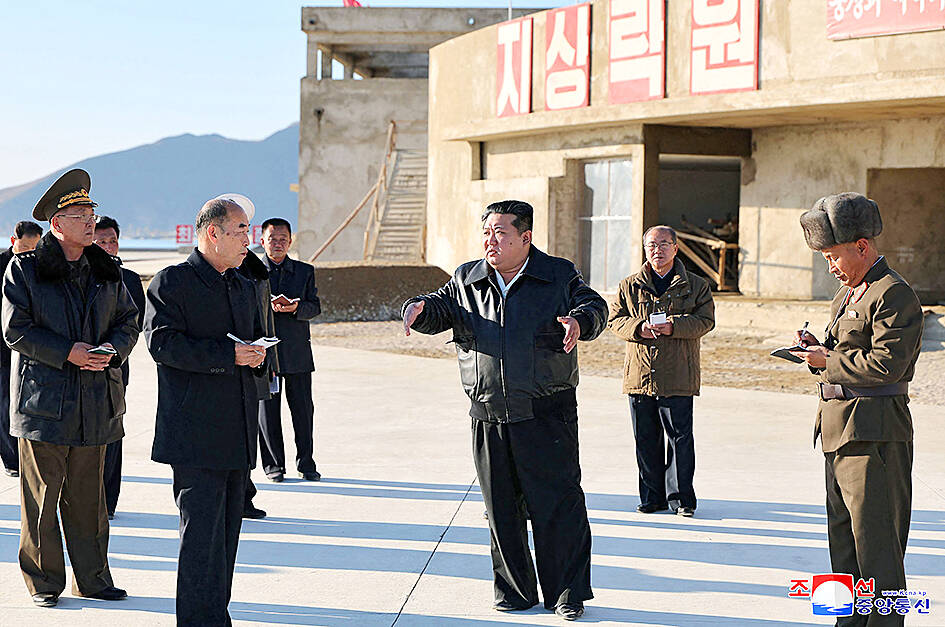Gunshots, screams, eerie laughter: South Korea’s border island Ganghwa is being bombarded nightly with blood-curdling sounds, part of a new campaign by the nuclear-armed North that is driving residents to despair.
Before it started, 56-year-old Kim Yun-suk fell asleep to the hum of insects and woke to the chirping of birds. Now, she is kept awake every night by what sounds like the soundtrack of a low-budget horror movie at top volume.
“The peaceful sounds of nature... have now been drowned out,” Kim said.

Photo: AFP
“All we hear is this noise.”
The campaign is the latest manifestation of steadily declining ties between the two Koreas this year, which have also seen Pyongyang test ever more powerful missiles and bombard the South with trash-carrying balloons.
Since July, North Korea has been broadcasting the noises for huge chunks of almost every day from loudspeakers along the border.
The northern point of Ganghwa — an island in the Han river estuary on the Yellow Sea — is only about two kilometers from the North.
The nighttime broadcast includes what sounded like the screams of people dying on the battlefield, the crack of gunfire, bombs exploding, along with chilling music that starts at 11pm.
In the almost pitch-black fields, sinister noises echoed as the stars in the clear night sky shone beautifully alongside the coastal road lights, creating a stark and unsettling contrast.
North Korea has done propaganda broadcasts before, said 66-year-old villager Ahn Hyo-cheol, but they used to focus on criticizing the South’s leaders, or idealizing the North.
Now “there are sounds like a wolf howling, and ghostly sounds,” he said. “It feels unpleasant and gives me chills. It really feels bizarre.”
Ganghwa county councilor Park Heung-yeol said the new broadcasts were “not just regime propaganda — it’s genuinely intended to torment people.”
TORTURE
Experts said the new broadcasts almost meet the criteria for a torture campaign.
“Almost every regime has used noise torture and sleep deprivation,” said Rory Cox, a historian at the University of St Andrews.
“It is very common and leaves no physical scarring, therefore making it deniable.”
Exposure to noise levels above 60 decibels at night increases the risk of sleep disorders, experts said. Levels of up to 80 decibels late at night on Ganghwa have been recorded.
“I find myself taking headache medicine almost all the time,” said An Mi-hee, 37, adding that prolonged sleep deprivation due to the noise has also led to anxiety, eye pain, facial tremors and drowsiness.
“Our kids can’t sleep either, so they’ve developed mouth sores and are dozing off at school.”
Distraught and desperate, An traveled to Seoul and got on her knees to beg lawmakers at the National Assembly to find a solution, breaking down in tears as she described the island’s suffering.
“It would actually be better if there were a flood, a fire or even an earthquake, because those events have a clear recovery timeline,” An said.
“We have no idea if this will go on until the person in North Korea who gives the orders dies, or if it could be cut off at any moment. We just don’t know.”
‘HORROR FLICK’
The noise tormenting Ganghwa island residents appeared to be a rudimentary mix of clips from a sound library, typically common at any TV or radio broadcasters, audio experts said. The sound effects are “like something found in a South Korean horror film in the 70s and 80s,” said sound engineer Hwang Kwon-ik.
The two Koreas remain technically at war since the 1950 to 1953 conflict ended in an armistice not a peace treaty.
North Korean leader Kim Jong Un this year declared Seoul his “principal enemy” and has ramped up weapons testing and built closer military ties with Russia.
The isolated and impoverished North is known to be extremely sensitive about its citizens gaining access to South Korean pop culture. Some experts have suggested the latest broadcasts could be aimed at preventing North Korean soldiers from hearing the South’s own propaganda broadcasts, which typically feature K-pop songs and international news.
In August, just weeks after South Korea resumed K-pop broadcasts in response to Pyongyang floating trash-carrying balloons south, a North Korean soldier defected by crossing the heavily fortified border on foot.
But Lee Su-yong, an audio production professor at the Dong-Ah Institute of Media and Arts, said: “If there is sound coming towards the North that you want to mask, then the sound (you use to cover it) must also be directed toward the North.”
“It seems less about masking noise and more about inflicting pain on people in the South,” he said.
Choi Hyoung-chan, a 60-year-old resident, said the South Korean government had failed to protect vulnerable civilians on the frontier.
“They should come here and try to live with these sounds for just 10 days,” he said, referring to officials in Seoul.
“I doubt they could even endure a single day.”

June 9 to June 15 A photo of two men riding trendy high-wheel Penny-Farthing bicycles past a Qing Dynasty gate aptly captures the essence of Taipei in 1897 — a newly colonized city on the cusp of great change. The Japanese began making significant modifications to the cityscape in 1899, tearing down Qing-era structures, widening boulevards and installing Western-style infrastructure and buildings. The photographer, Minosuke Imamura, only spent a year in Taiwan as a cartographer for the governor-general’s office, but he left behind a treasure trove of 130 images showing life at the onset of Japanese rule, spanning July 1897 to

One of the most important gripes that Taiwanese have about the Democratic Progressive Party (DPP) is that it has failed to deliver concretely on higher wages, housing prices and other bread-and-butter issues. The parallel complaint is that the DPP cares only about glamor issues, such as removing markers of Chinese Nationalist Party (KMT) colonialism by renaming them, or what the KMT codes as “de-Sinification.” Once again, as a critical election looms, the DPP is presenting evidence for that charge. The KMT was quick to jump on the recent proposal of the Ministry of the Interior (MOI) to rename roads that symbolize

On the evening of June 1, Control Yuan Secretary-General Lee Chun-yi (李俊俋) apologized and resigned in disgrace. His crime was instructing his driver to use a Control Yuan vehicle to transport his dog to a pet grooming salon. The Control Yuan is the government branch that investigates, audits and impeaches government officials for, among other things, misuse of government funds, so his misuse of a government vehicle was highly inappropriate. If this story were told to anyone living in the golden era of swaggering gangsters, flashy nouveau riche businessmen, and corrupt “black gold” politics of the 1980s and 1990s, they would have laughed.

Imagine being able to visit a museum and examine up close thousand-year-old pottery, revel alone in jewelry from centuries past, or peer inside a Versace bag. Now London’s V&A has launched a revolutionary new exhibition space, where visitors can choose from some 250,000 objects, order something they want to spend time looking at and have it delivered to a room for a private viewing. Most museums have thousands of precious and historic items hidden away in their stores, which the public never gets to see or enjoy. But the V&A Storehouse, which opened on May 31 in a converted warehouse, has come up